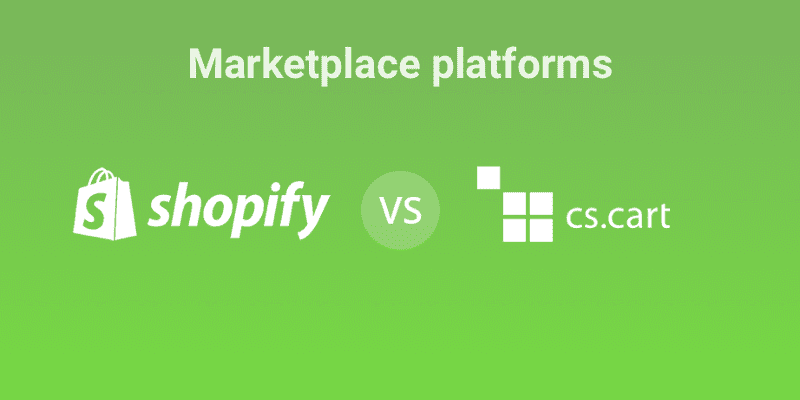Shopify + Multi Vendor Marketplace plugin by WebKul vs. CS-Cart Multi-Vendor marketplace eCommerce platform
Shopify is a well-known hosted platform for running a web store. It has 10% of the ecommerce market according to BuiltWith which is a remarkable result. But this refers to regular web stores and what about multi vendor marketplaces?
Shopify does not offer multi vendor functionality by default and if you want to make an online marketplace with Shopify, you’ll have to look for third-party extensions.
Webkul Marketplace App is one of the most popular extensions for Shopify. This add-on has more reviews in Shopify App store than other multi vendor plugins, so, that’s why I decided to look into it.
You may also be interested:
Top multi vendor marketplace solutions
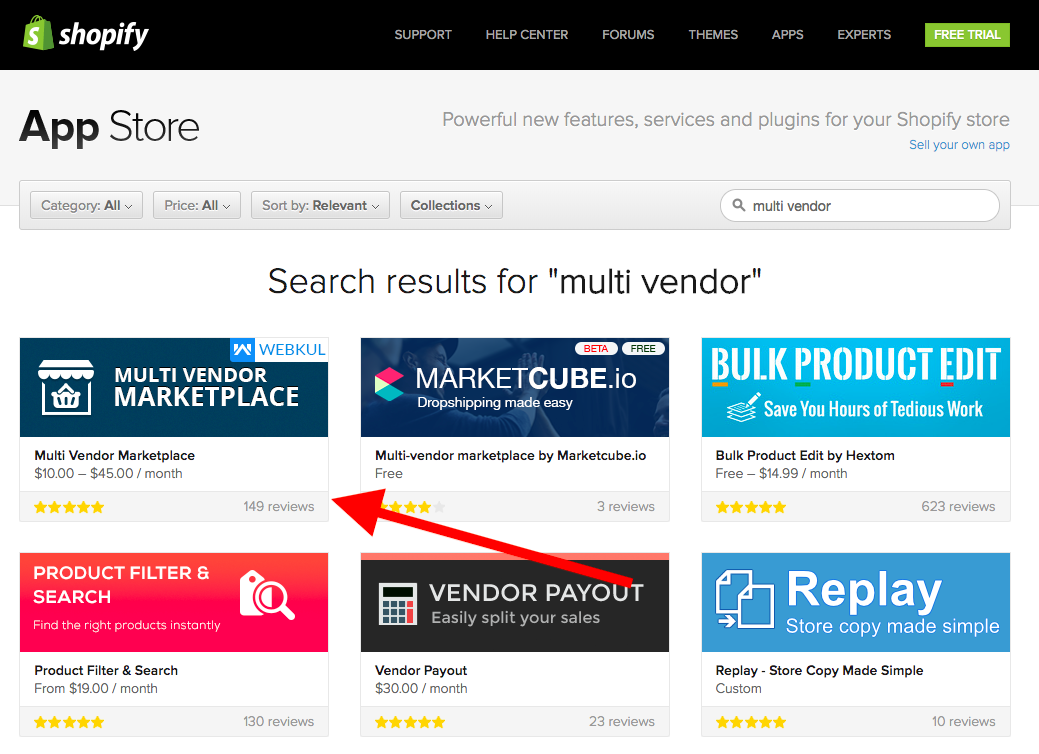
- Popularity & top cases
- Customizations & Scalability
- Admin panel: the first impression
- Look and feel
- Features
- Technical support & documentation
- Community
- Partner network
- Pricing
- Conclusion
1. Popularity & top cases
Here’s the thing, Shopify itself is quite popular. However, “Multi Vendor Marketplace” plugin by WebKul has nothing to do with Shopify’s popularity.
It is important not to confuse these 2 products as Shopify is not created for running marketplaces and in this review, we deal with online marketplaces only.
Speaking of the multi vendor plugin by WebKul, there are no examples of existing marketplaces powered by Shopify “Multi Vendor Marketplace” on Webkul’s website.
Is it so important to have live examples of online shopping mall? Sure it is! The popularity of a shopping platform and good examples of real projects are a significant index of the platform’s viability.
If you use a well-known shopping cart solution, you get upgrades with new features, security updates. And it’s much easier to find a reliable developer if you need to make custom features for your marketplace.
After all, can a widely-used product disappear from the market all of a sudden? It is unlikely.
We’re proud to list the most beautiful examples of marketplaces on our website and their number is constantly growing.
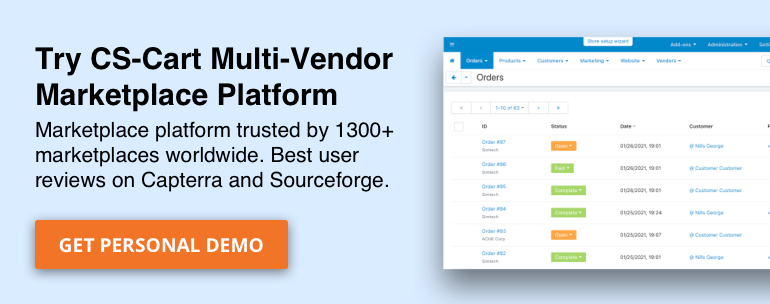
2. Customisations & scalability
As a rule, online marketplaces showcase thousands and millions of products. It is important to make sure your mall will be able to handle hundreds of concurrent connections and won’t be down because of a heavy load.
Of course, you won’t have that big number of visitors and products during the first months, but thinking ahead is what differs wise and successful entrepreneurs from newbies.
The cost of a mistake is way too high here.
As for scalability, let’s get back to examples of online malls – actions speak louder than words. Just take a look at www.shopclues.com, 53 million products… This project can be called an online marketplace by right.
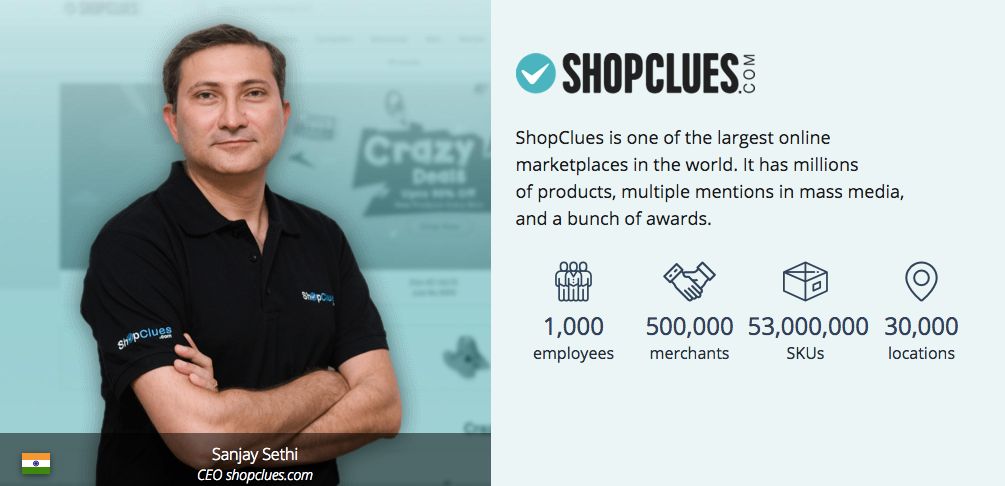
There are no ready marketplace solutions that could totally satisfy the needs of each and every business. And that’s OK, so apart from scalability it is important to assess the possibility of modifications.
Even if you don’t plan to modify your online marketplace right now, hopefully your project becomes successful. And if it will, you’ll come to the next stage called “I need a customized solution”.
With CS-Cart Multi-Vendor marketplace system, you get open access to the source code at no additional cost. It is possible to add new features, local payment & shipping methods, and integrate a custom design.
And what is cool about CS-Cart Multi-Vendor, is the freedom of choice. You can modify your online shopping mall by yourself or just hire one of 360 partners listed in CS-Cart Marketplace.
If you decide to make modifications by yourself, our Core API documentation and Developer Guide will be of great help.
I’ve spent an hour searching for some information about customizations for Shopify Multi Vendor Marketplaces by WebKul. I suppose, they can customize the plugin according to one’s needs but this is just an assumption – there’s no info about that on their website.
Shopify is easy to start with. You won’t have to choose a hosting company, install the software and make server settings. Forget about upgrades since your store is hosted and upgraded by the software developer. You just need to create an account, make basic settings, add your products and that’s it.
SaaS technologies have even forced out on-premises software to some extent. Many software developers had to create hosted versions of their shopping cart software. And some even discontinued development of downloadable versions and completely switched to cloud solutions. For instance, a famous on-premises solution Interspire transformed into Bigcommerce, a hosted shopping cart.
Nothing is perfect, and hosted solutions have one common disadvantage: you don’t have an access to the source code. It means that you won’t be able to add a new feature or modify the existing functionality.
The bottom line here is that the CS-Cart Multi-Vendor web marketplace system is highly customizable unlike the marketplace solution offered by Webkul.

3. Admin panel: the first impression
I’ll describe my personal impression of Shopify multi vendor solution by Webkul. The original Shopify admin panel looks clear and classy, here it is:
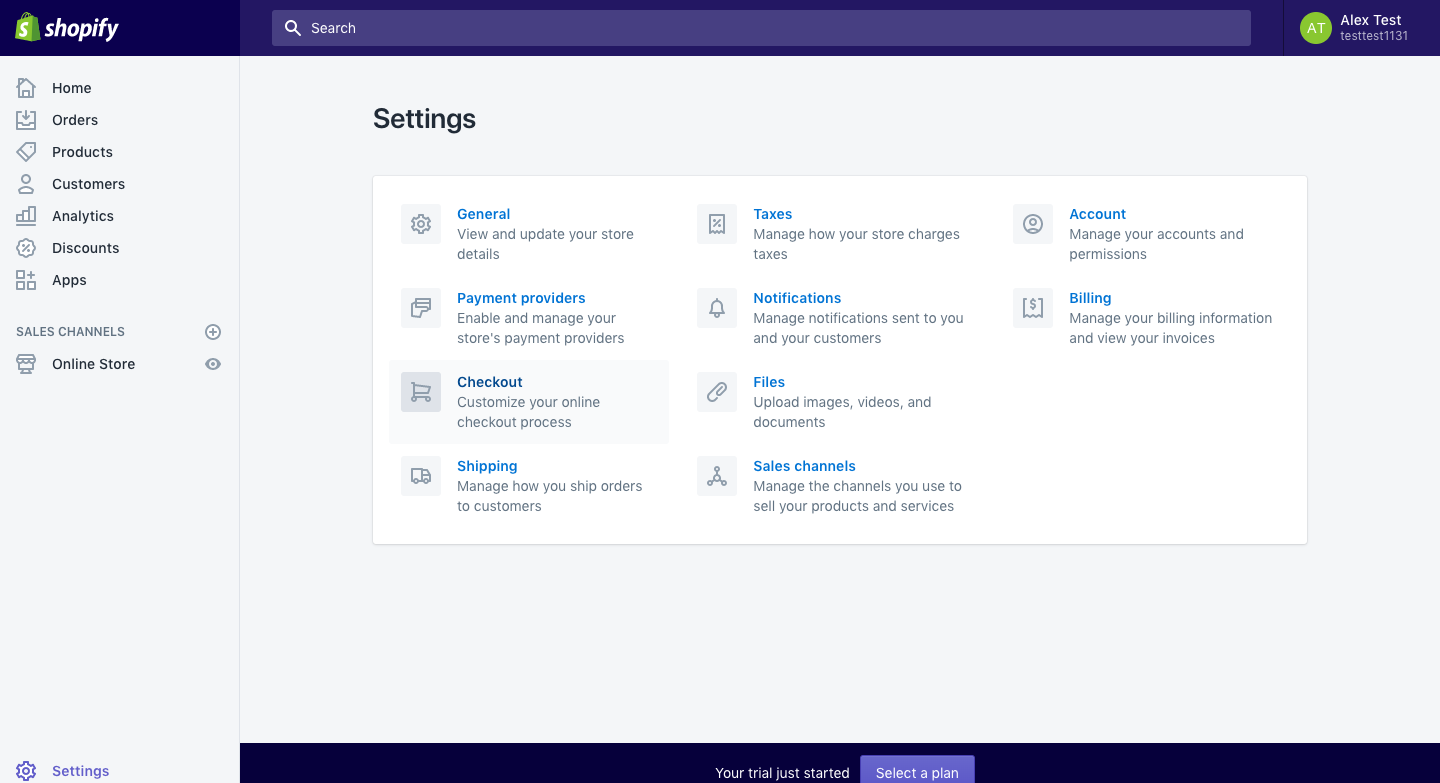
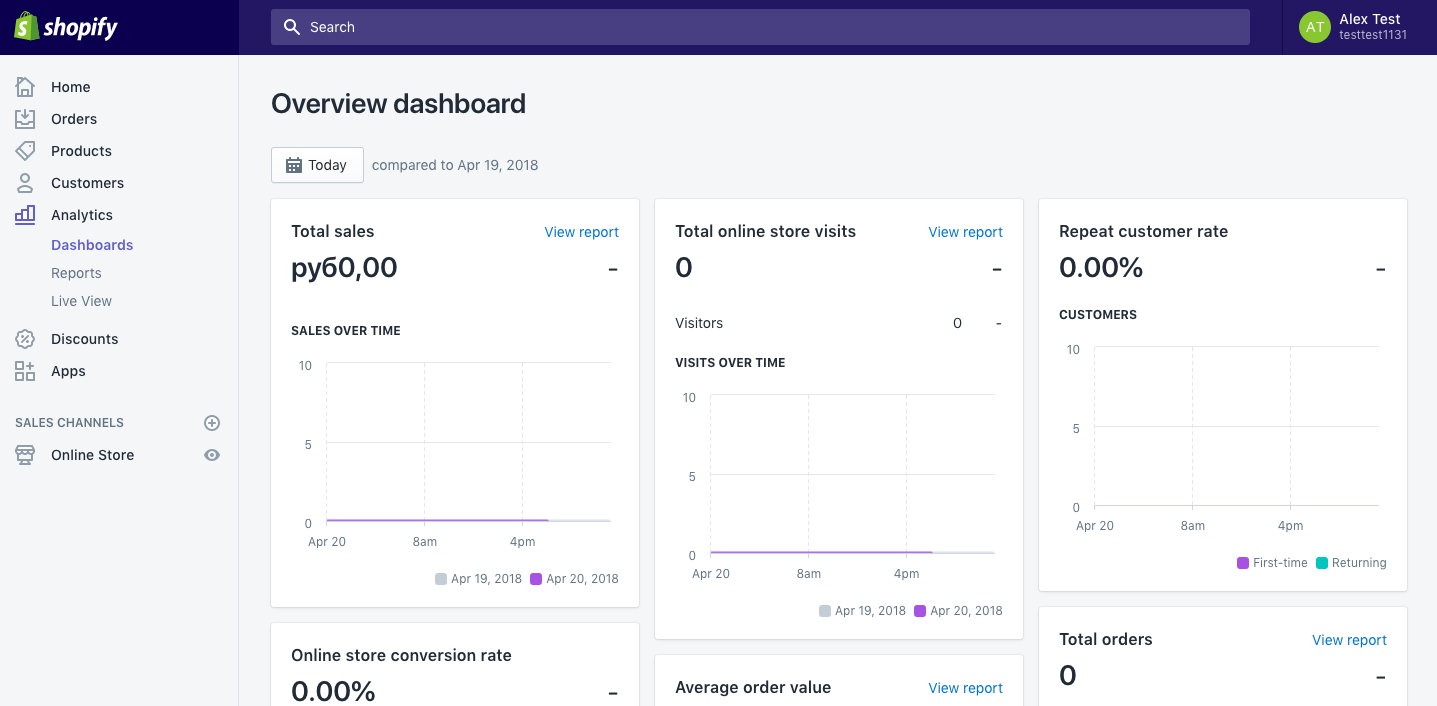
And here is how Shopify looks like when Webkul’s plugin is enabled.
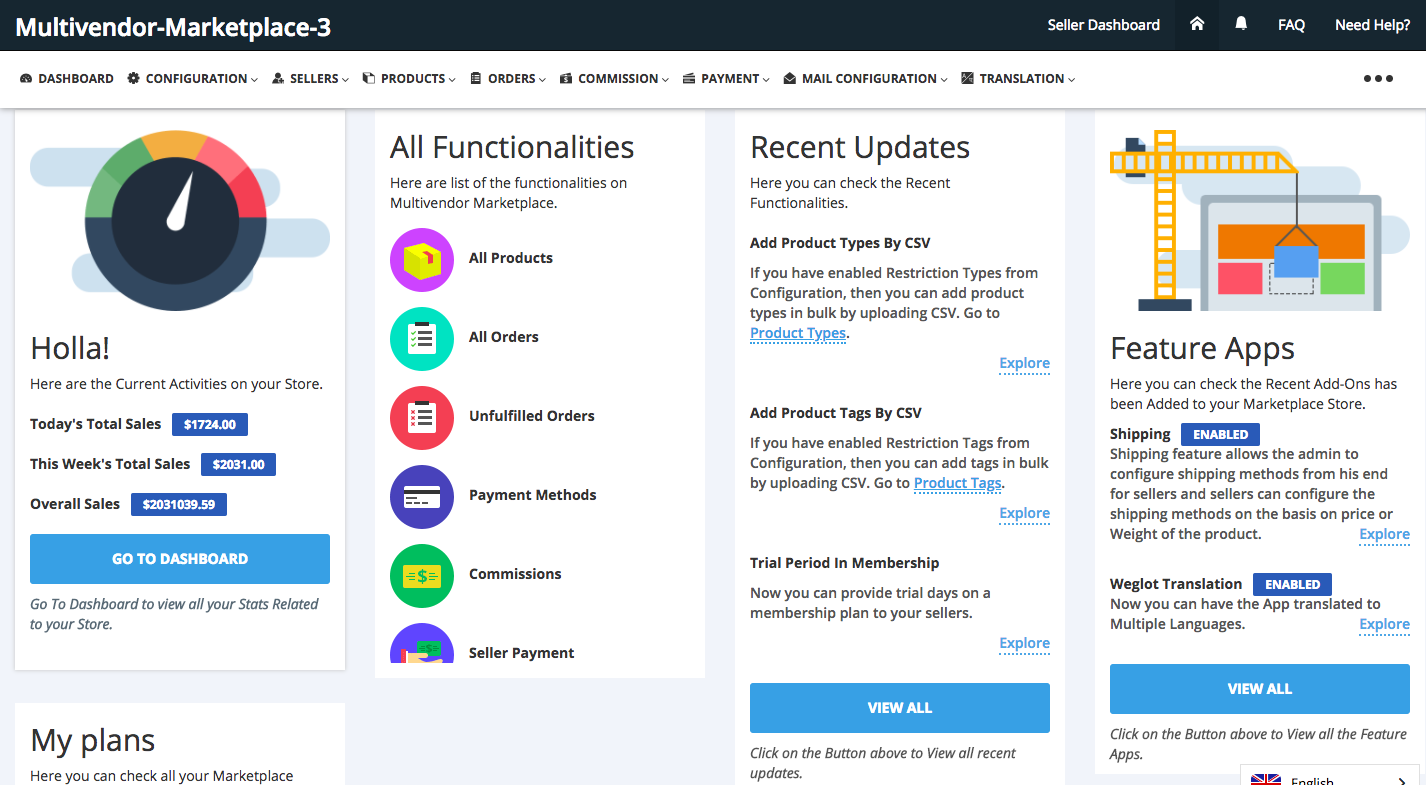
To me it’s too confusing. It’s just impossible to to see what’s what :) And what do you think?
It looks like I’m not the only one who thinks like that:

As for CS-Cart Multi-Vendor shopping mall management software, here is what it looks like for the store’s admin:
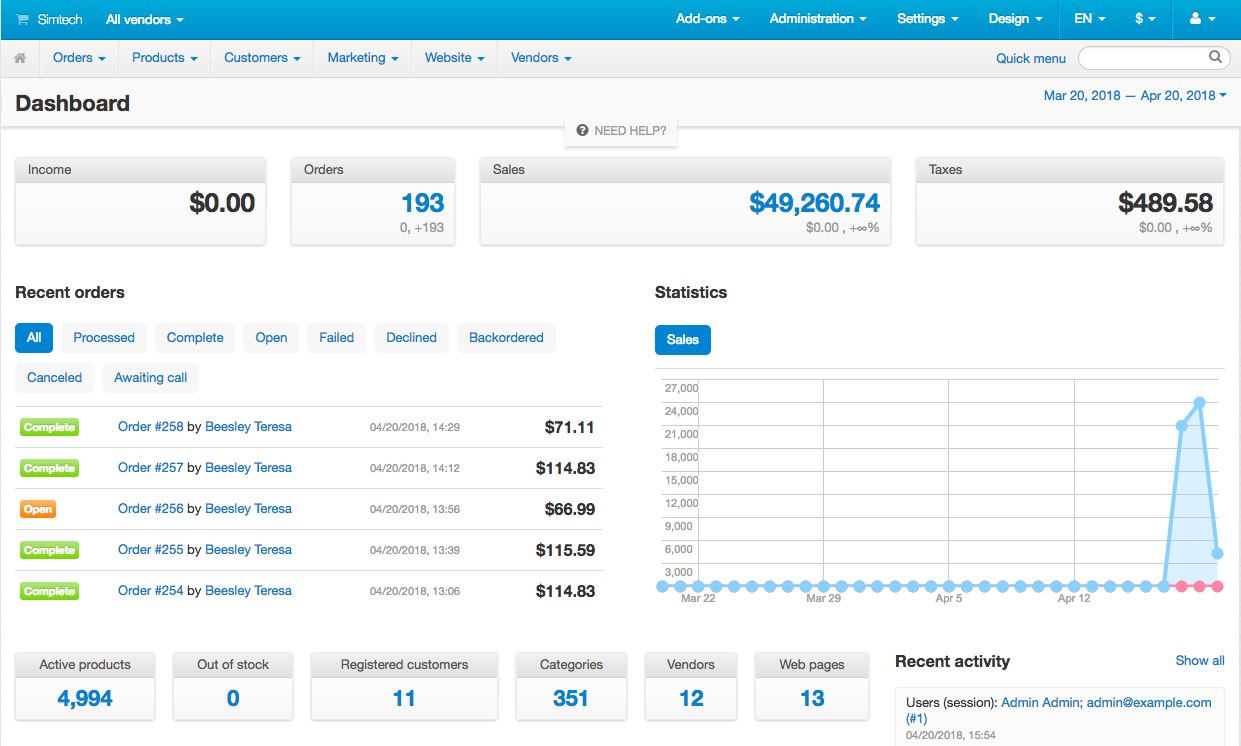
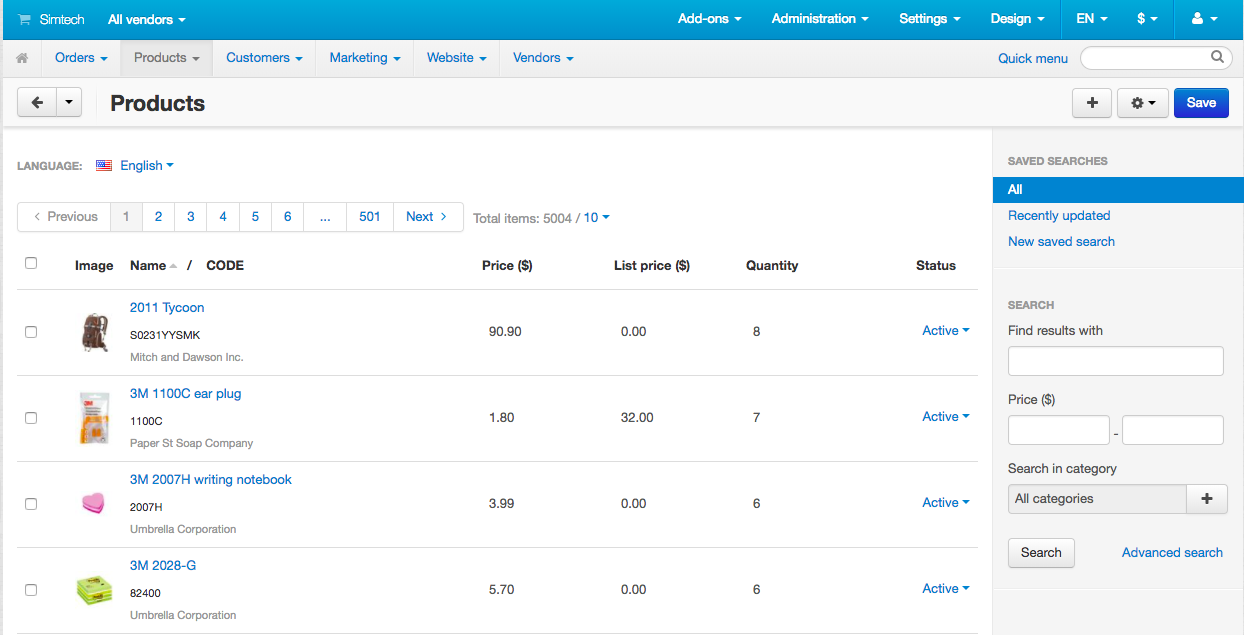
Ecommerce experts commended the interface together with deep functionality of the CS-Cart Multi-Vendor multi store system.
…dedicated for creating multi-vendor marketplace, it comes with tons of great features and stylish looking user interface which makes it stand alone in the competition.
Multivendorshoppingcarts.com
A quick and easy turnkey web marketplace solution solution that works out of the box, CS-Cart Multi-Vendor stores are user friendly and supported by resilient back end coding and in-depth reporting
Expertmarket.co.uk
And according to American Webmasters Association:
“CS‑Cart is a very powerful e-commerce platform. Even in the crowded and growing online shopping cart market, CS‑Cart stands out as one of the best with an excellent combination of user-friendliness, affordable pricing, scalability, and extensive functionality.

4. Look and feel
If a web store’s look is outdated and primitive, it will hardly inspire confidence in the minds of buyers. So, the look and feel of a shopping cart system is very important.
It would be logical to check out and compare live stores of both marketplace it solutions, but, unfortunately, there are no examples of live shopping mall built with “Multi Vendor Marketplace” plugin by WebKul. At least easily accessible ones.
So, let’s compare online demos of CS-Cart Multi-Vendor and Shopify Multi vendor by Webkul.
They say, a picture’s worth a thousand words, so, watch these two short videos where we play around with the demos.

Shopify Multi vendor by Webkul demo

CS-Cart Multi-Vendor demo

5. Features
E-commerce is a rapidly changing environment where only those survive who adapt. In time, it became not enough just to have a nice-looking website. Today a web store or an online marketplace must be mobile-friendly, meet latest security requirements, be fast. Not to mention marketplace – specific functionality.
Here you can find a list of Webkul’s features for their multi vendor solution for Shopify.
And here is a detailed description of multi vendor-specific functionality offered by the CS-Cart multi store system:
6. Technical support & documentation
I’ve tried to access Webkul Marketplace App admin panel several times and only the first one was successful. For some reason, it looked like this the next day.
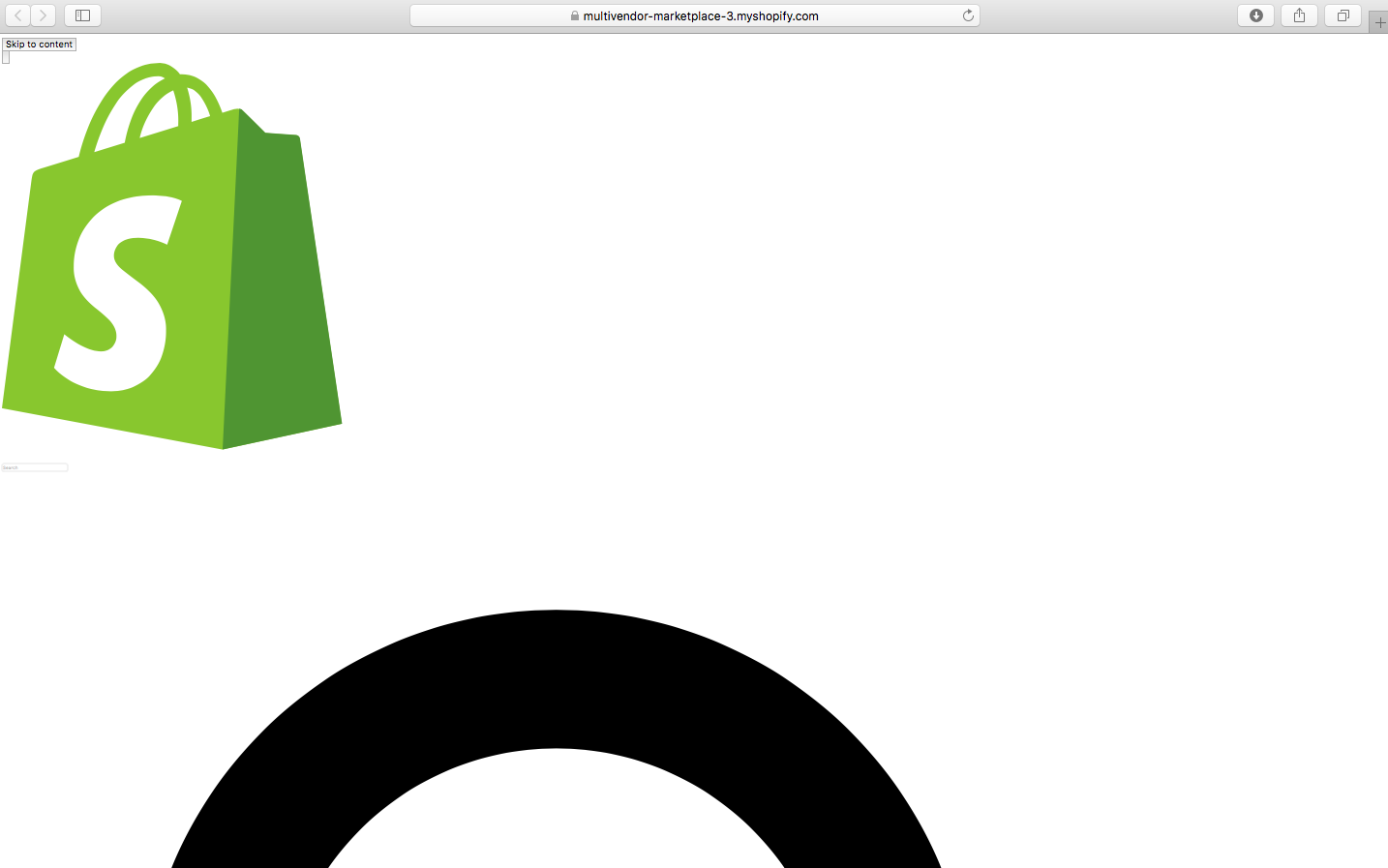
Things happen but this one looks like a big concern. With issues like this one or minor questions users turn to technical support for help.
What both platforms offer in terms of support, documentation, and education materials?
CS-Cart Multi-Vendor
Every customer gets 90-days of free technical support on purchasing the Multi-Vendor license. Here’s what we assist you with during the free support period:
- Explaining how to configure the default CS-Cart features.
- Answering general questions on how to set up the CS-Cart marketplace eCommerce platform.
- Solving problems that occurred because of the wrong CS-Cart configuration.
- Setting up the default CS-Cart functionality.
- Advising on the CS-Cart architecture and light functionality modifications.
- Exploring questions concerning the CS-Cart workflow, if they are not the result of a third-party code modification.
Besides, we guarantee to correct all security bugs found in the original source code absolutely for free. Fixes for non-security bugs and errors are provided in further software releases. For more information please read this article.
As for documentation, we have a detailed User Guide. It includes 475 articles describing every Multi-Vendor feature. Apart from User Guide, Core API documentation and Developer Guide are at your disposal.
Below you can see an example of a User Guide article for CS-Cart Multi-Vendor.
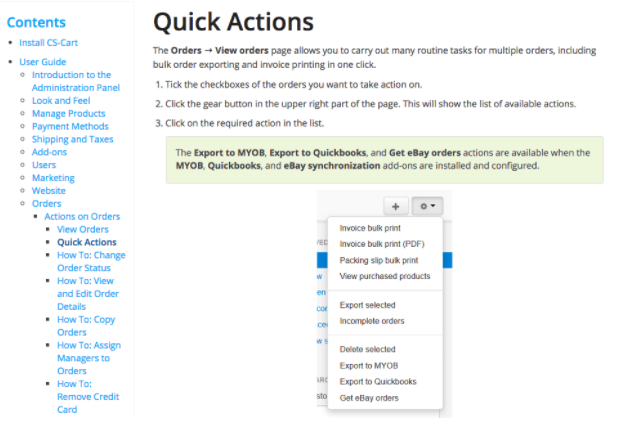
For you to get familiar with Multi-Vendor shopping mall software, we’ve prepared video tutorials. We have 60 video lessons for CS-Cart & Multi-Vendor and 10 extra video tutorials.

Shopify marketplace by WebKul
Webkul team provide technical support via tickets in their Support Center. I’d advise to look through user reviews and comments on technical support service.
Of course, you’ll find poor reviews of any product including CS-Cart Multi-Vendor. Nevertheless, it is constructive negative reviews that are usually informative and useful for those who choose marketplace system.

Speaking of Webkul, their instructions for multi-vendor shopify consist of 8 articles.
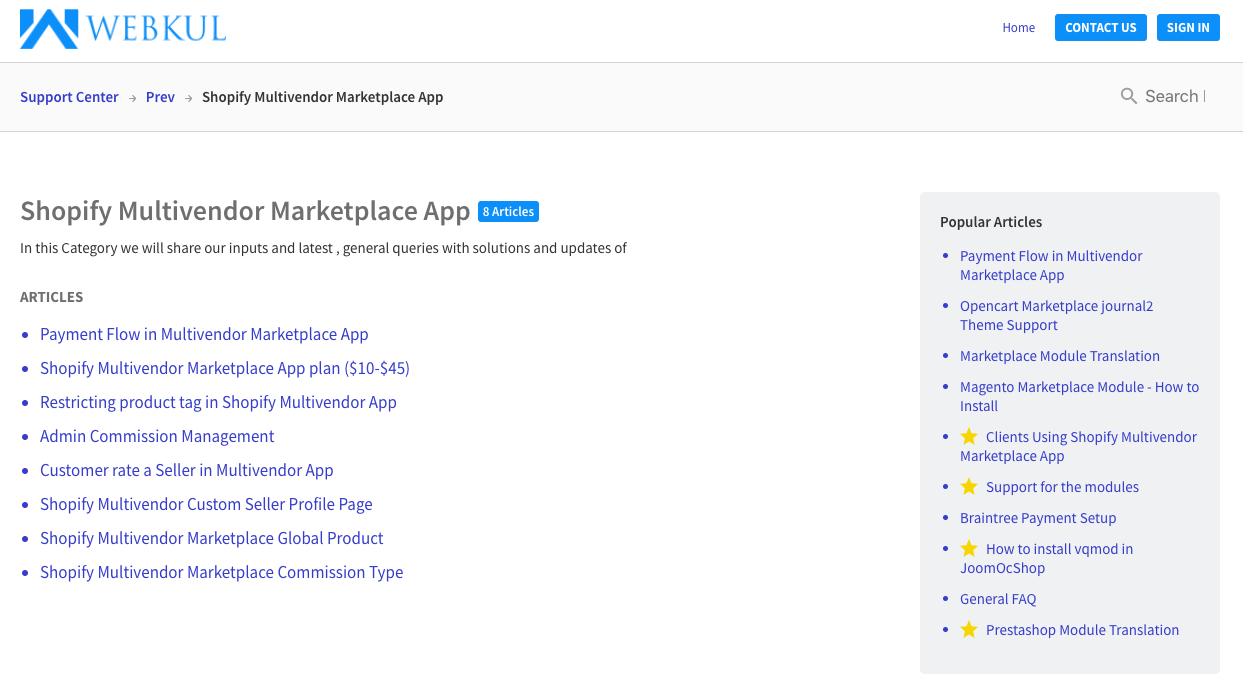

7. Community
Having a huge community around the product is important not only for users but for the product itself. Community members not only help each other and share their experience. They can literally influence the product development.
CS-Cart Multi-Vendor
Marketplace owners are always aware of recently added features and the planned functionality updates thanks to the What’s New in Multi-Vendor section on our website.
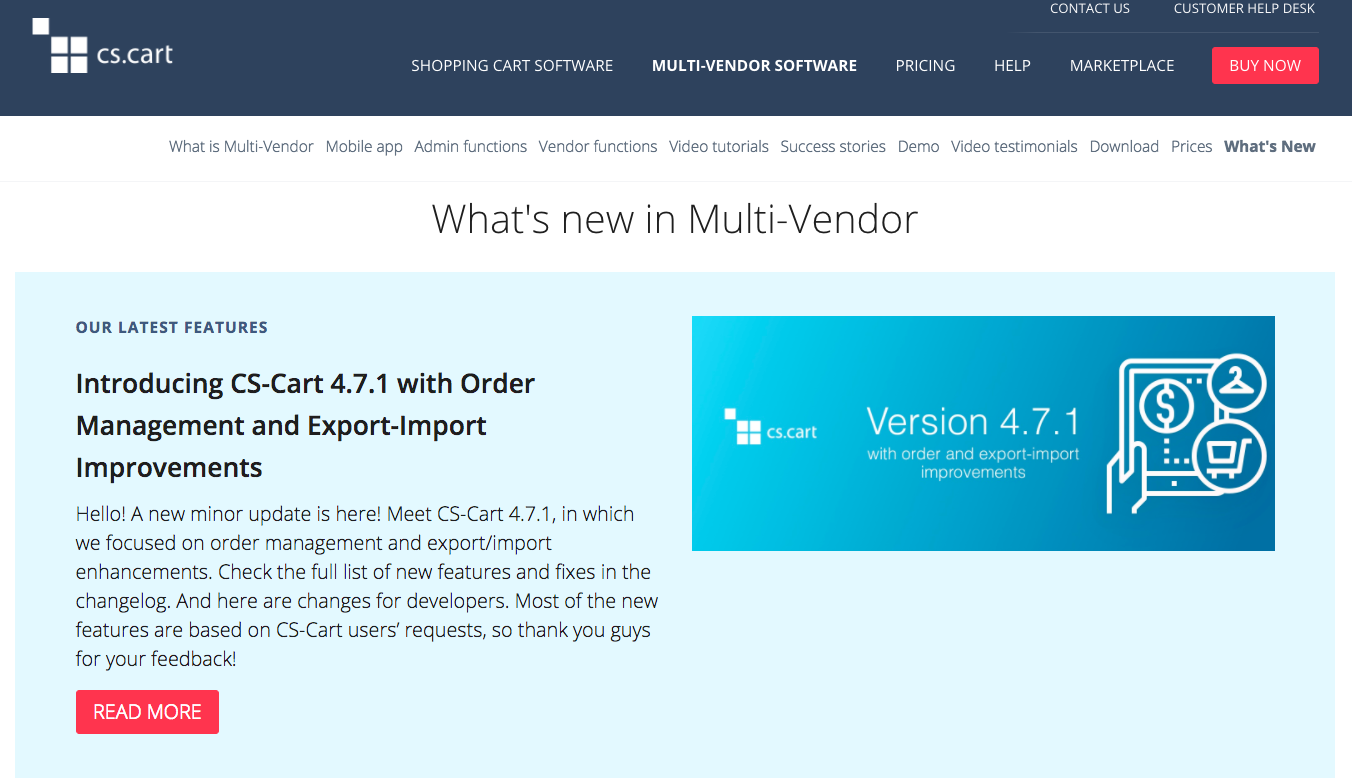
Apart from technical support, users can easily report any issues they face while working with CS-Cart Multi-Vendor. Thus our shopping mall management software is constantly being improved.
Currently, 24407 users are registered in our Forums. They watch videos and comment on our YouTube Channel, follow us on Facebook and Twitter, read our blog.

It’s really pleasant and useful to get customer feedback. Our clients share their experience of working with the CS-Cart Multi-Vendor multi store system.
We’ve recently published 33 video reviews of our customers on our website. Some are related exclusively to Multi-Vendor and some to CS-Cart software in general.
Multi-Vendor Software Testimonials

Webkul Marketplace App for Shopify
I’ve failed to find their Community Forums, “user voice” resource, blog, or something like that. No real users video reviews that might prove that there are active marketplaces built with Webkul Marketplace App.
As far as I see, the only communication channel is Webkul’s support center.

8. Partner network
Partners grow the community around the product. They distribute and adapt the software to the needs of local entrepreneurs around the globe.
Webkul Marketplace App for ShopifyI didn’t find any lists of registered partners on their website. It looks like third-party services are not available in this case.
CS-Cart Multi-Vendor
We have distributors in 37 countries. Thanks to this, it is easy to find a local representative and get support in your native language.
No matter where you are situated, you may well arrange a meeting with one of 300 development partners and discuss your project face-to-face. It is much more convenient compared with Skype or emails.






If your project requires custom functionality, be sure to check our Marketplace with hundreds of add-ons and themes. Most likely, you won’t need to waste time on custom development – there are many ready-to-use add-ons in our Marketplace.
9. Pricing
Let’s take Webkul Marketplace App for Shopify, its cost of use consists of 3 points (I won’t take support and customization expenses into account here)

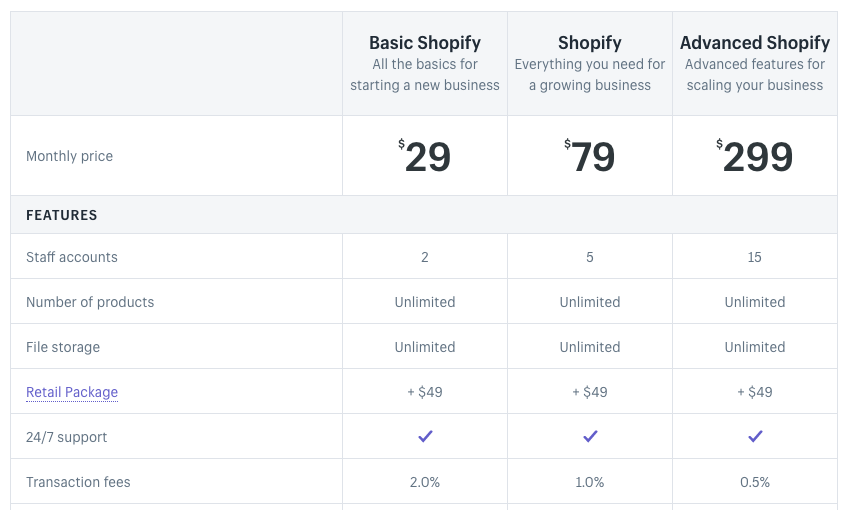
Hopefully, your online business will live for years and if it turns out like that, your expenses with Webkul Marketplace App for Shopify will be as follows:

CS-Cart Multi-Vendor costs $1,450.
This price includes:
- A lifetime license
- 90 days of free technical support
- 1 year of free upgrades
No transaction fees.

10. Conclusion
This is not a subjective opinion. These are facts that can be easily checked.
- Unlike CS-Cart Multi-Vendor, which is standalone shopping mall software, Webkul Marketplace App is a third-party solution. Thus your online marketplace depends not only on Shopify, but on WebKul specialists as well. What if the third-party developers disappears from the market?
- There are no live examples of marketplaces built with Webkul Marketplace App. CS-Cart Multi-Vendor provides detailed success stories that inspire those who start their online business.
- There’s no community around Webkul Marketplace App.
- Unlike CS-Cart Multi-Vendor, you cannot modify Webkul Marketplace App.
- Webkul Marketplace App is unstable according to user reviews and my own experience – their demo’s admin panel didn’t work.
- There’s no detailed documentation for Webkul Marketplace App.
- Webkul Marketplace App for Shopify does not offer functionality required for running an online marketplace.
- But for all that, using Webkul Marketplace App for Shopify is much more expensive than running a marketplace with one of the best marketplace platforms – CS-Cart Multi-Vendor.

By Alexander Shabayev
Head of CS-Cart sales team
Yan Anderson is the Head of Content Marketing at CS-Cart with over 10 years of experience in the eCommerce industry. He's passionate about explaining complicated things in simple terms. Yan has expertise in building, running and growing eCommerce marketplaces. He loves to educate people about best practices, new technologies, and trends in the global eCommerce industry.
